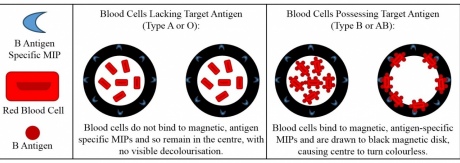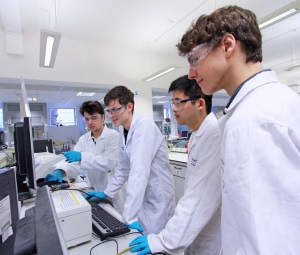Pioneering blood test developed by students wins College competition

A group of Imperial undergraduate students have developed an innovative, low-cost test to determine a person's blood type.
The team, known as Hidden Gens, includes Stanislav Piletsky, Zeyu Yang and Cristian Zagar from the Department of Chemistry and medical student Simon Rabinowicz. They took home top prize at the Faculty of Natural Science’s Make a Difference competition (FoNS-MAD) last week for their blood-type testing kit which is significantly cheaper to produce than those currently on the market.
We designed the world’s first antibody-free blood test
– Stanislav Piletsky
Hidden Gens
Standard blood-type tests rely on the use of antibodies, which are expensive and have a limited shelf life. Hidden Gens created a test which does not require antibodies - instead using nanoparticles called Molecularly Imprinted Polymers (MIPs), which are significantly cheaper, easier to produce, and last for much longer.
MIPs can be created to bind to particular blood antigens - surface markers on red blood cells that determine blood type. The MIPs used by the team are magnetic; if the given antigen is present, the blood cells are pulled towards a magnet leaving a clear solution behind, thus revealing the blood type.

The Make a Difference competition, which launched last year, challenged undergraduate students in the Faculty of Natural Sciences to harness their skills and creativity to develop low-cost technology that could bring benefits to society.

The Hidden Gens team using spectroscopy as part of the development of their test
Hidden Gens were one of three student teams to reach the final stage of the competition, all of whom were given access to funds and facilities to develop their project to a proof-of-concept stage over eight weeks this summer.
Team member Stanislav Piletsky said: “We founded the project and team when we found out about the Make a Difference competition in January. We began considering applications of MIP technology, which we knew was versatile but underdeveloped, and settled on blood antigens as a target molecule because we knew this was largely unexplored.
“The test we designed is the world’s first antibody-free blood test - it can be made in minutes using inexpensive chemicals.”
Game-changing
The team has now submitted a patent with the help of Imperial Innovations, and is currently exploring the process of commercialising the technology. They are also looking at other important molecules that can be detected using this technology, to create simple, cheap, 'home testing' kits for diseases that currently require lab analysis.
A key part of the College’s strategy is to achieve enduring academic excellence for the benefit of society. I couldn’t think of a better exemplar than this competition.
– Professor James Stirling
Provost
“We had a lot of support from our mentor in the competition, Professor Ramon Vilar. Before we began, he told us: ‘don't think that just because you're in your first year, you cannot make a difference’ I wholeheartedly agree with him," Piletsky said.
The team was announced as the winner at an event on Monday 26 October, where all finalists pitched their ideas to a panel of judges including Imperial’s Professor Lord Robert Winston and Professor Sir John Pendry, as well as Dr Ruth Allan - Manager in Consulting at Deloitte, and Professor Lesley Yellowlees – the first female president of the Royal Society of Chemistry.
Professor Tom Welton, Dean of the Faculty of Natural Sciences, said: "Hidden Gens should be incredibly proud of their achievement. Reaching the stage where you are applying for a patent is a great achievement for anyone, but for a group of undergraduates - so early in their career - it is exceptional. Their idea is game-changing, and a testament to their skill, innovation, and drive. I look forward to hearing of their future success."
Praising all students in the final, Provost Professor James Stirling said: “A key part of the College’s strategy is to achieve enduring academic excellence for the benefit of society. I couldn’t think of a better exemplar than this competition”
Article text (excluding photos or graphics) © Imperial College London.
Photos and graphics subject to third party copyright used with permission or © Imperial College London.
Reporter
Deborah Evanson
Communications Division